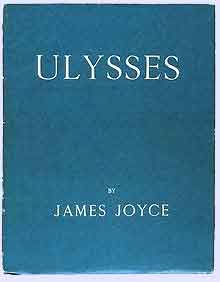|
|
 Ulysses is a 1922 novel by James Joyce that takes its title from the Latin version of the Greek name 'Odysseus'. It is sometimes cited as the greatest English-language novel of the 20th century and has been the subject of much scrutiny, criticism and controversy. Ulysses chronicles the passage through Dublin by its main character, Leopold Bloom, during an unremarkable day, June 16, 1904. The title alludes to the hero of Homer's Odyssey, and there are many parallels, both implicit and explicit, between the two works (e.g. the correlations between Leopold Bloom as Odysseus and Stephen Dedalus as Telemachus). June 16 is now celebrated by Joyce's fans worldwide as Bloomsday. Joyce chose that date because he and his eventual wife, Nora Barnacle, shared their first date on that day. Written over a seven-year period from 1914 to 1921, the novel was serialized in the American journal The Little Review from 1918, until the publication of the Nausicaa episode led to a prosecution for obscenity. The book was first published in its entirety in ) at Project Gutenberg Retrieved from "http://en.wikipedia.org/"
 |
|
|||||||||||||||||
